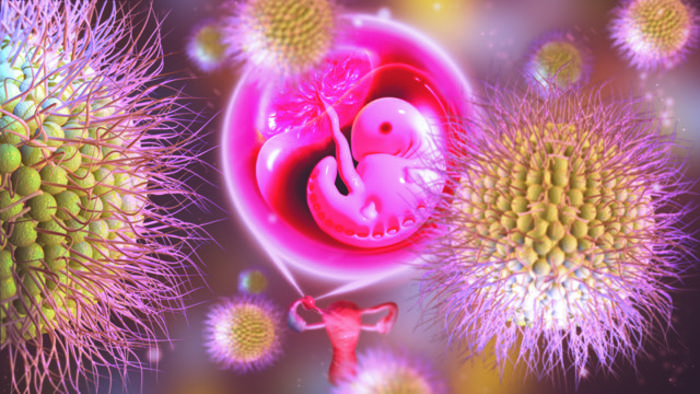PORTLAND, Ore. – Researchers in the Oregon State University College of Pharmacy have developed a drug delivery system that shows promise for greatly enhancing the efficacy of the medicine given to women with the life-threatening condition of ectopic pregnancy, which occurs when a fertilized egg implants somewhere other than the lining of the uterus.

Credit: Nanomedicine and ectopic pregnancy, graphic by Parinaz Ghanbari.
PORTLAND, Ore. – Researchers in the Oregon State University College of Pharmacy have developed a drug delivery system that shows promise for greatly enhancing the efficacy of the medicine given to women with the life-threatening condition of ectopic pregnancy, which occurs when a fertilized egg implants somewhere other than the lining of the uterus.
Olena Taratula of the OSU College of Pharmacy, and Maureen Baldwin and Leslie Myatt of Oregon Health & Science University led a team that used a mouse model to show that the drug, methotrexate, ends pregnancy at a comparatively low dose when administered via nanoparticles known as polymersomes.
Findings were published in the journal Small.
Ectopic pregnancies are non-viable and the leading cause of maternal death in the first trimester. Methotrexate, commonly abbreviated to MTX, fails at greater than 10% rate because it doesn’t always accumulate properly at the implantation site – a problem the polymersomes address.
MTX ends ectopic pregnancy by causing embryonic cells to stop dividing, and even when it works, it comes with a collection of potential negatives for the patient: nausea, vomiting, diarrhea, elevated liver enzymes, kidney damage and lung disease. A lower dose, the scientists say, would be a step in the right direction for reducing side effects as well as increasing efficacy.
Two percent of all pregnancies in the United States, and between 1% and 2% worldwide, are ectopic, the authors note. In the U.S. alone that translates to approximately 100,000 ectopic pregnancies annually.
About 98% of ectopic implantations happen in the fallopian tubes, putting women at risk of hemorrhage and death.
“Developing drugs able to target specific locations in the body remains one of biomedicine’s greatest challenges,” Taratula said. “Most of the drugs prescribed today, including MTX, have no means of working only on specific tissues or cells. When drugs affect healthy cells, it can drastically reduce a patient’s quality of life – think of the severe effects of chemotherapy like hair, loss of the lining of the gut, ulcer formation, nausea, etc.”
Taratula, Baldwin and other researchers at OHSU and the Oregon State College of Pharmacy sought to reduce MTX’s shortcomings by exploring whether packaging it in a special type of nanoparticle, polymersomes, would enable the drug to target only embryonic cells.
Polymersomes are hollow spheres that are synthetic versions of liposomes, lipid-based sacs found in all living cells. The scientists developed a polymersome that would respond to the high concentrations of a substance known as glutathione in placental cells; loading MTX into polymersomes keeps it from acting until the glutathione triggers its release.
“A dose of MTX delivered by polymersomes induced the end of pregnancy in mice, whereas the same dose of MTX by itself didn’t,” Taratula said. “To achieve the same therapeutic efficacy with MTX alone, we had to increase the dosage sixfold. Also very promising is that, after having pregnancies ended by MTX-loaded polymersomes, mice successfully conceived and gave birth to healthy offspring.”
Collaborators on the study included Babak Mamnoon, Abraham Moses, Constanze Raitmayr and Oleh Taratula of the OSU College of Pharmacy and Terry Morgan of OHSU. The College of Pharmacy, the OHSU School of Medicine and the National Institutes of Health provided funding.
Taratula is also continuing her research into using other types of nanoparticles to both diagnose and end ectopic pregnancies. A year ago she led a collaboration that developed a light-sensitive nanoparticle for those purposes, and she recently received a $3 million grant from the National Institutes of Health to develop a magnetic nanoparticle platform.
The magnetic nanoparticles would potentially be even more effective than the light-sensitive ones, she said, because a magnetic field has deeper tissue penetration than light.
Journal
Small
DOI
10.1002/smll.202302969
Method of Research
Experimental study
Subject of Research
Animals
Article Title
Glutathione-Responsive Methotrexate Polymersomes for Potential Management of Ectopic Pregnancy
Article Publication Date
14-Jul-2023
COI Statement
The authors declare no conflict of interest.




